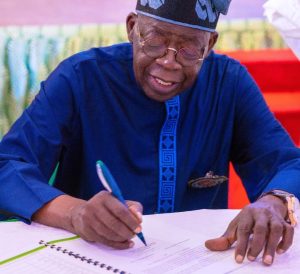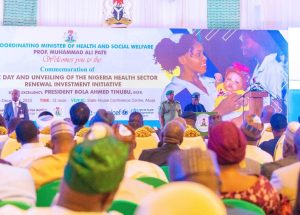Nigeria’s President, Bola Ahmed Tinubu has announced plans for a comprehensive revamp of physical infrastructure, equipment and the re-training of frontline health workers starting in 2024.
READ ALSO: Speaker Abbas Urges More Investments In Health Sector To Save Naira
President Tinubu made this known during the unveiling of the 2023 Universal Health Coverage and signing of Compact by Federal, State Governments, and Development Partners in Abuja on Tuesday.

The President said that the government is embarking on the revamp following the importance of primary healthcare in building a resilient and integrated healthcare system for the country.
He further disclosed that the Basic Health Care Provision Fund (BHCPF), will be redesigned to enhance access to essential healthcare services as outlined in the National Health Act (2014).
President Tinubu said to achieve these, his administration is prioritizing, coordination and implementation of all initiatives and it will not be partisan.
“Delivering improved quality health is an underpinning factor in my promise of Renewed Hope to Nigerians. That hope is ignited here today with the support of all multilateral partners and agencies, health is back on the front burner.
”This occasion marks an opportunity for collective reflection and action as we recommit ourselves to the noble pursuit of health for all. The theme for this year ‘Health for All: Time for Action’ encapsulates the urgency and the determination with which we must approach this noble goal.

”Health is not merely the absence of disease but the embodiment of physical, mental, and social well-being. It is a fundamental human right and Nigeria’s commitment to achieving Universal Health Care Coverage is reflected in the unwavering dedication of my administration to uphold this right for every individual, young or old, in rural or urban areas,” the President said.
Speaking on several key policy actions of the administration in the health sector, the Coordinating Minister of Health and Social Welfare, Prof. Muhammad Ali Pate explained that the BHCPF has been redesigned as the foundational basis for a sector-wide approach.

He added that the BHCPF, comprising at least 1% of the Consolidated Revenue Fund, is expected to receive at least $2.5 billion in pooled and non-pooled financing from 2024 to 2026 to improve the primary health system nationwide.
The Minister outlined plans to double the number of fully functional Primary Healthcare Centres (PHCs) from 8,809 to 17,618 by 2027 across all 36 states and the Federal Capital Territory (FCT), adding that these PHCs will be linked to a comprehensive emergency care system.
Stressing the importance of transparent reporting, Prof. Pate stated that the federal government will make resource allocation, releases, and results transparent to all stakeholders, including government bodies, non-governmental partners, civil society organizations, and citizens.
He noted that the increased allocation in the proposed 2024 budget for health and social welfare sectors has demonstrated the political will of the Tinubu administration to achieve Universal Health Coverage (UHC) and improve the health of Nigerians.

”Thanks to Mr. President, the Federal Government is making significant investments in health infrastructure and equipment for our hospitals, as well as the provision of critical commodities, the expansion of health insurance, alongside heightened attention to the welfare of the health workforce,” he stated.
The Director General of the World Health Organisation, Dr Tedros Ghebreyesus, described the health renewal compact signed by the federal and State governments of Nigeria as a commitment to build on previous achievements.
“So I welcome the fact that the Government of Nigeria is walking that talk with the health sector renewal Investment Initiative.
“I congratulate you on this initiative, with its goals of strengthening governance, improving access to quality care, supporting research and development and local production, and strengthening health security and climate resilience,” he added.
He charged the Nigerian government to further make the initiative work adding that it requires rigorous implementation and careful monitoring to ensure value for money performance.


Comments are closed.